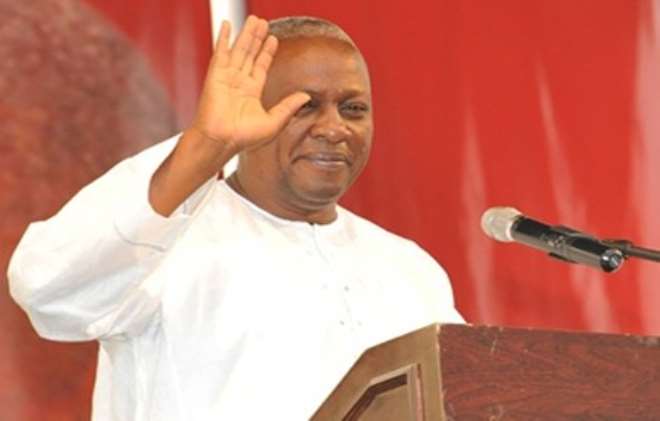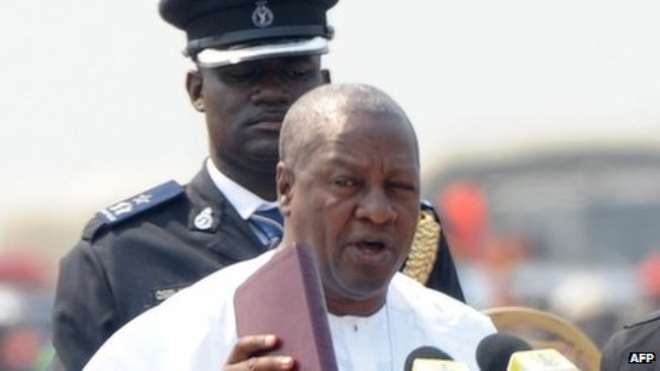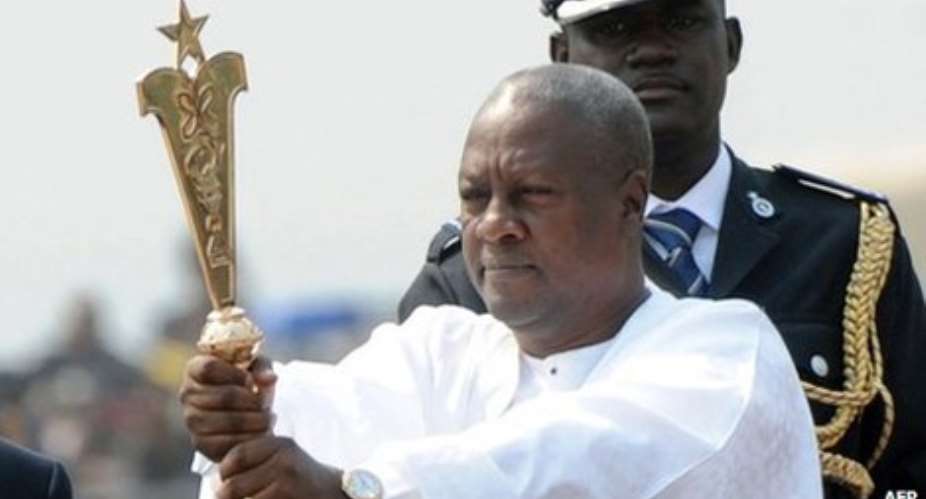On 7th January 2013 a newly elected President in the person of John Dramani Mahama was sworn into office in Ghana as the 4th successive President in the 4th Republic of the country. Until his investiture, Mahama was the caretaker President following the demise in July 2012 of John Atta Mills, the then substantive President, to whom Mahama was the Vice. Elections were already due when he stepped into the shoes of Mills and on 10th December 2012 the Electoral Commission declared him winner of the elections and thus the clarion inauguration.
The rise of Mahama to the presidency has been meteoric and steady at the same time. Born on 29th November 1958 he followed the footsteps of his father into parliament, but unlike his father the young Mahama went a step further. He is a respected communication expert, historian, and writer. In government, he served in several roles and capacities, rising to become Minister of Communications and subsequently Vice President before becoming a caretaker President and finally the elected President in his own right.
Ghana is internationally acclaimed as the poster face of true democracy in Africa and thus the inauguration attracted foreign dignitaries from across the world. Thirteen Presidents from the sub-region and other parts of Africa graced the occasion. They included the African Union Chairperson and President of Benin Yayi Boni, Nigeria's President Goodluck Jonathan and South Africa's President Jacob Zuma. This was a diplomatic seal of approval of the integrity of democracy in Ghana, but also a punctilious endorsement of the elections.
The opposition New Patriotic Party (NPP) is meanwhile contesting the veracity of the election results. They find little merit in the verdict of the Electoral Commission, the international observer community as well as the local observers, all of which are in consensus that the results are free and fair, and represent the will of the people. To make their point the NPP petitioned the Supreme Court for redress.
Even those who disagree with the NPP do acknowledge that the pursuit of their claims in court rather than in the streets is a feather to the democratic credentials of the country where the rule of law is supreme. To buttress such democracy and the unity of the country, the only two surviving Heads of State and both Presidents in the fourth Republic, Jerry John Rawlings of the ruling party and John Agyekum Kufuor of the opposition NPP, attended the inauguration and congratulated their successor.
In his inaugural speech President Mahama waxed lyrical with great optimism for the country and pledged to keep the promises he made in his campaign trail. He emphasised that “Ghana is on the cusp of enormous transformation. We are moving forward at a rapid pace. New resources are at our disposal; new alliances are being formed.
The opportunities posed by these gains could result in a self-sufficiency that was always imagined and desired, but was never a realistic occurrence in the foreseeable future, not in the way it is right now.”
The new President is not unaware of the many hurdles he has to overcome to turn the opportunities available to Ghana into real benefits for his people. Infrastructural development, for instance, is regrettably bare in the 1st country to achieve independence in sub-Saharan Africa.
Health care delivery, accessible and quality education, energy sufficiency, roads and efficient transport, pipe-borne water and effective sanitation are basics in the 21st century that still leave much to be desired. All of these will require not only a strong political commitment but a radical re-evaluation of the needs of the ever changing society in order to design radical projects that meet the expectations of this generation and the next.
In a postmortem analysis of the 2012 Elections in Ghana, one Professor Nugent speaking on a programme organised by Chatham House (a UK based think-thank) noted that it was critical for President Mahama to pay attention to the needs of urban communities in the country, particularly the provision of roads, electricity and water, as well as ensuring that sustained economic growth trickles down to all sections of the country. It is a call to duty that Mahama will have to rise up to if the challenges that confront the nation are to be addressed and redressed urgently.
There is so much enthusiasm and optimism in Ghana to succeed and this can only be harnessed through visionary leadership and political will. President Mahama seems to be that kind of visionary and young energetic leader that Ghana needs at this critical time in its forward match.
Irrespective of partisan differences and affiliations, one can only hope that he will be given the necessary support by all Ghanaians to translate the promise of the potential into reality. For that to happen, the President will have to be seen as the first in taking bold and concrete initiatives to mend the fractures of the elections and to cement the unity of the nation.
Ghana is a peace loving nation and the people are proud of their history and their democracy. By the recent peaceful elections and the serene inauguration of the 4th John and the 4th President in the 4th Republic, Ghanaians are poised to stay the course and make Ghana the ultimate pride and gateway to Africa. Surely, President John Dramani Mahama has his work cut out in this endeavour. There is no time for honeymoon.
Long live democracy!!
Long live Ghana!!!
Long live Africa!!!!
STEPHEN ATALEBE , African student at Mendel University Brno. Czech Republic.
 PRESIDENT JOHN MAHAMA 1
PRESIDENT JOHN MAHAMA 1
 PREZ JOHN DRAMANI MAHAMA
PREZ JOHN DRAMANI MAHAMA
 PREZ MAHAMA SWEARING IN
PREZ MAHAMA SWEARING IN





 List of 24 ministerial nominees approved by Parliament
List of 24 ministerial nominees approved by Parliament
 You were my inspiration, made me who I am today – Lilian Kumah
You were my inspiration, made me who I am today – Lilian Kumah
 Rainstorm destroys Hohoe E.P. Senior High School building
Rainstorm destroys Hohoe E.P. Senior High School building
 John Kumah strongly supported me to become NPP flagbearer – Bawumia reveals
John Kumah strongly supported me to become NPP flagbearer – Bawumia reveals
 Late John Kumah urged me to run for NPP flagbearer, strongly supported me — Bawu...
Late John Kumah urged me to run for NPP flagbearer, strongly supported me — Bawu...
 Akufo-Addo appoints Joseph Kpemka as Deputy MD of BOST
Akufo-Addo appoints Joseph Kpemka as Deputy MD of BOST
 Ablakwa petitions CHRAJ to investigate sale of SSNIT's hotels to Rock City Hotel
Ablakwa petitions CHRAJ to investigate sale of SSNIT's hotels to Rock City Hotel
 MoF to provide new bailout for defunct Gold Coast Fund investors – Bawumia revea...
MoF to provide new bailout for defunct Gold Coast Fund investors – Bawumia revea...
 OMCs implement price adjustments despite International petroleum price declines
OMCs implement price adjustments despite International petroleum price declines
 Petition to remove Kissi Agyebeng will disrupt operations of OSP – Martin Kpebu
Petition to remove Kissi Agyebeng will disrupt operations of OSP – Martin Kpebu
